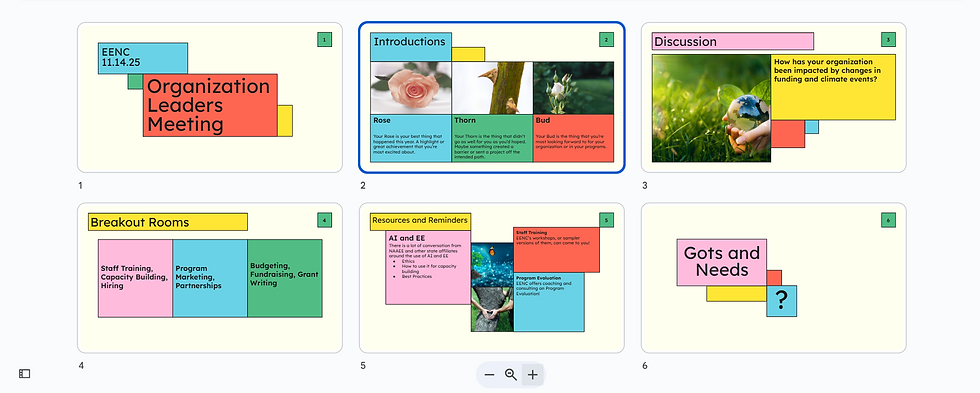Making a Plan for EE to Survive and Thrive Beyond This Pandemic
- EENC Staff Team
- Dec 18, 2020
- 2 min read
Updated: Aug 17, 2023
Since the pandemic was announced in March, EENC's response to support the field of environmental education (EE) was pretty immediate - responding to the new "right now" as it develops. In August, we began to feel it was critical to start having some longer term/bigger visioning strategies to ensure EE survives and thrives as the world continues to change. EENC, along with the N.C. Office of Environmental Education and Public Affairs, launched an Advisory Council to review the reality of COVID's impacts on environmental education as a whole, envision what the future of environmental education should look like, and then help identify strategies for how to make that vision happen.
We convened 30 thought leaders from across the state representing a wide range of backgrounds - from school and formal education partners, to higher education faculty, to nonformal education leaders in programs large and small. This group met five times over the fall. First, we reflected on our own experiences and reports coming out at the national level about the impacts of COVID-19 on our field.
From there, the Advisory Council identified the needs we think are here to stay:
Stronger partnerships between formal educators, nonformal environmental education programs, and community programs.
Shared communications and storytelling, so that we're not all trying to make for the case for why EE is important independently
Continued virtual programming/engagement, whether its to provide pre- and post-visit support, or as an opportunity to engage learners outside the usual driving distance, or even just so people can continue learning on their own schedules.
Rethinking the role of an Environmental Educator. "Other Duties As Assigned" doesn't quite capture all the responsibilities, skills, and expectations environmental educators are going to need to succeed.
General EE Capacity Building. Let's face it, there need to be more, higher-paying EE positions, more people providing environmental education, and more money to support equitable participation in EE.
Considering these needs, we developed a comprehensive list of action strategies. These action items are being distributed to partners across the state, so that we can all work to the best of our capacity to help elevate the field. You will see calls to action to participate in these initiatives from EENC, the Office of Environmental Education and Public Affairs and other partners over the next year, so that environmental education in North Carolina has a thriving future.







Comments